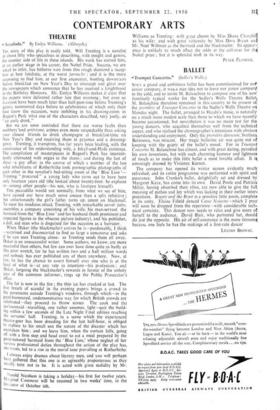CONTEMPORARY ARTS
THEATRE
gi Accolade." By Emlyn Williams. (Aldwych.)
THE story of this play is easily told. Will Trenting is a novelist. of about fifty who specialises in describing, with insight and.genius, the seamier side of life in these islands. His work has earned him, at an earlier stage in his career, the Nobel Prize. Success, we are asked to infer, has hitherto won from this rough diamond a recep- tion at best fatalistic, at the worst farouche ; and it is the more surprising to find him, at our first encounter, bustling downs•.airs before breakfast on New Year's Day to intercept and gloat over the newspapers which announce that he has received a knighthood in the Birthday Honours. Mr. Emlyn Williams makes it clear that the papers were delivered rather late that morning ; but even so it cannot have been much later than half-past-nine before Trenting's guests, summoned days before to celebrations of which only their host knew the occasion, were imbibing in his drawing-room in Regent's Park what one of the characters described, very justly, as "an early drink."
But we are soon reminded that there are worse faults than snobbery 'and arrivisme, crimes even more unspeakable than asking your closest friends to drink champagne at breakfast-time on New Year's Day and receiving them in pyjamas and a dressing- gown. Trenting, it transpires, has for years been leading, with the connivance of his understanding wife, a Jekyll-and-Hyde existence.
The compilation of masterpieces in Regent's Park has intermit- tently alternated with orgies in the slums ; and during the last of these—a gay affair in the course of which a number of the less solid inhabitants of Rotherhithe took pornographic photographs of each other in the novelist's bed-sitting room at the ' Blue Lion '- Trenting " procured " a young lady who turns out to have been only fourteen years old (she looked about twenty-four. he explains to—among other people—his son, who is fourteen himself).
This peccadillo would not normally, from what we see of him, have caused our hero much more unease than a split infinitive ; but unfortunately the girl's father turns up, intent on blackmail.
To meet his insidious attack Trenting, with remarkable savoir faire, assembles a company consisting of his wife, his man-servant the barmaid from the Blue Lion ' and her husband (both prominent and respected figures in the obscene picture industry), and his publisher, a dull, sad man who is disguised for the occasion as a barrister. When Daker (the blackmailer) arrives he is—pardonably, I think —surprised and disconcerted to find so large a concourse and asks if he can seen Trenting alone: so Trenting sends them all away. Daker is an unsuccessful writer. Some authors, we know, are more successful than others, but few can ever have done quite as badly as this poor wretch, for he has written two and a half million words and nobody has ever published any of them anywhere. Now, at last, he has the chance to assert himself over one who is at the head of what is—at any rate in intention—his profession ; and Daker, forgoing the blackmailer's rewards in favour of the unholy joys of the common informer, rings up the Public Prosecutor's office.
The fat is now in the fire ; the thin ice has cracked at last. The first breath of scandal in the evening papers brings a crowd to the pavements outside Trenting's windows, through which—in the good-humoured, undemonstrative way for which British crowds are celebrated—they proceed to throw stones. The cook and the parlourmaid—travelling, one rather assumes, light—quit the build- ing within a few seconds of the Late Night Final edition reaching the servants' hall. Trenting, in a scene which the experienced theatre-goer has been dreading for the last half-hour, is obliged
to explain to his small son the nature of the-disaster which has overtaken him ; and we leave him, when the curtain falls, going
of with a firm step and head erect to eat a meal prepared by the good-natured barmaid from the ' Blue Lion,' whose neglect of her various professional duties throughout the action of the play has, one trusts, led to a rise in the moral tone prevailing at Rotherhithe.
I always enjoy dramas about literary men, and you will perhaps have gathered that this one is as agreeably preposterous as they usually turn out to be. It is acted with great stolidity by Mr.
Harold Nicolson is taking a holiday—his first for twelve years. Marginal Comment will be resumed in two weeks' time, in the Spectator of October 6th. Williams as Trenting: with great charm by Miss Diana Churchi as his wife: and with great virtuosity by Miss Dora Bryan an Mr. Noel Willman as the barmaid and the blackmailer. Its appear-1 ante is unlikely to much affect the odds at the call-over for EN( Nobel prize ; but it is splendid stuff in its way.
PETER FLEMING.






































 Previous page
Previous page